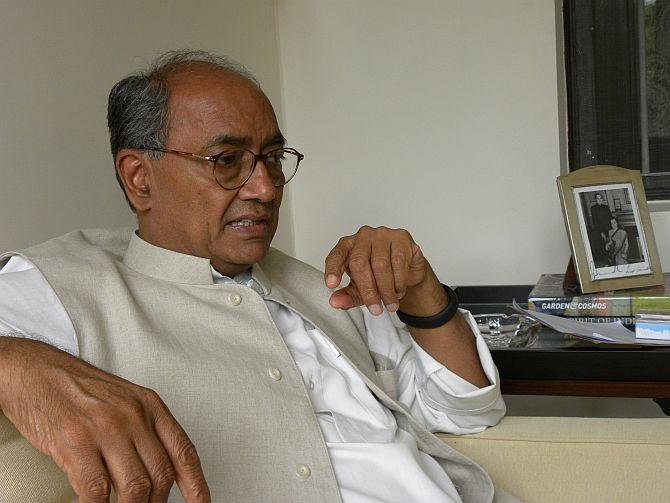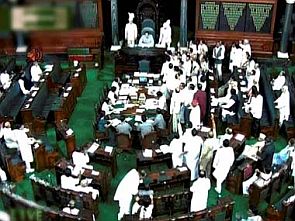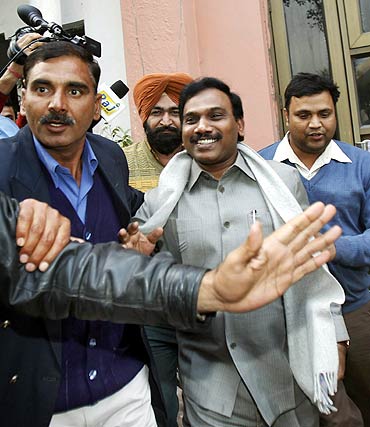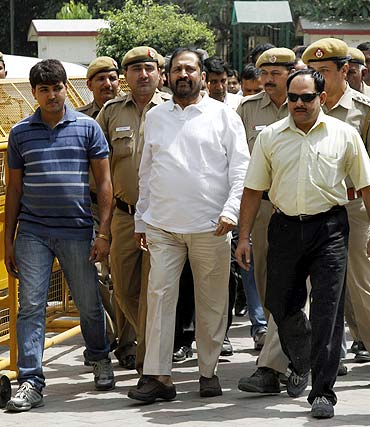 | « Back to article | Print this article |
'I have the best of relations with BJP and RSS leaders'
Digvijaya Singh has opinions on virtually every subject under the sun when the media seek him out for bytes.
But what is the garrulous Congress leader like in private?
Rediff.com's Vaihayasi Pande Daniel spent time with Singh at his New Delhi home recently.
A candid, exclusive, interaction with the Indian Internet's most controversial politician. The first of a two-part interview:
"Would you have dinner with Mr Narendra Modi?"
His answer comes back swiftly without a blink:
"I wouldn't mind," says Digvijaya Singh, general secretary of the All India Congress Committee. "I have no problem."
Are the divisions between the Congress and Opposition very deep, deeper than they have ever been, and is it very hard to maintain a civil relationship?
Digvijaya Singh: In fact, I have the best of relations with all BJP leaders in my state (Madhya Pradesh), even at the Centre. I have no problem.
But are the divisions really deep?
Digivijaya Singh: My personal relationship is quite different from my political ideology. I follow a political ideology and there is no compromise on that.
As far as my public relationships are concerned, I have the best of relations with BJP and RSS leaders.
We are sitting on the verandah-drawing room of his Delhi bungalow, facing a neatly trimmed front lawn, where peacocks flounce about.
Singh's bungalow is on Lodhi Estate, next to former petroleum minister Murli Deora's Delhi home.
When I arrive there is a frantic bustle at the bungalow; energy levels are high. The lane outside is crammed with vehicles. More keep drawing up as time lapses.
Digvijaya Singh has an afternoon slot, post 4 pm, when he meets minor political leaders, the public and journalists.
At his office -- located close to the gate; the bungalow is further behind -- an army of pyjama/dhoti-wallahs patiently wait. An atmosphere of expectation builds up and more and more people flow in, including camera crews and reporters.
"Aa gaye hai kya (has he come?)" is asked many times over.
As the melee swells -- people sit on top of tables or float about in the driveway -- the chance to have enough time, more than a few minutes with Singh, amidst this scrimmage, appears distant.
After about 20 minutes of waiting, one of his personal assistants comes across and tells me: "Aapko andar bulaya hai (You have been called inside)." Under the collective curious gaze of umpteen pairs of Congresswallah eyes, I head out first to his office next door and then inside his bungalow.
Please click NEXT to read further...
'If there is a democracy, there have to be politicians'
If the average city dweller feels that Indian politics is messed up at this point, what do you have to say to him or her?
Digvijaya Singh: Well, there are dark sheep all over.
But can we have a system or any other form of governance other than democracy?
If there is a democracy, there have to be politicians.
Ultimately, it is the people who elect the representatives.
Ultimately, the people are responsible and accountable in a democracy. And the elected representatives are accountable and responsible to the people through the legislature or through their office.
We have to understand that there may be disillusionment among the youth and in the urban areas because of certain reasons -- the non-performance of the government or the non-performance of the elected representatives.
But they must also understand that we have a parliamentary democracy system.
An MLA or member of Parliament is not the executive head of his constituency in the system. He is a part of the legislature, but it is implemented through the executive, which is accountable to the legislature, but not accountable to the people directly.
It is the politicians who are directly accountable.
Disillusionment among the youth in the rural and urban areas can be resolved if the people's representatives are more sensitive and more accessible to the people's needs. So therefore I think you cannot blame the system.
You can't blame all politicians.
I think we have to understand the nuances of parliamentary democracy and ultimately to the people who elect the government.
Please click NEXT to read further...
'Anyone who does wrong has to be accountable'
What do you think should be done with these black sheep?
Digvijaya Singh: If anyone does wrong he would come back to the people after five years. He can be voted out...
Crash! Someone keeps banging aggressively, almost angrily on the verandah door. Expecting it to be some of the hordes of Congresswallahs looking for him, there is a pause.
Digvijaya Singh laughs.
Digvijaya Singh: It is the peacock. It keeps fighting with its image in the glass!
Then you have to also ensure that anyone who does wrong has to be accountable.
If he has broken the rules, there should be no protection. He should be punished.
There cannot be two sets of rules -- one for the common man and one for the privileged political person. There have to be the same rules.
The law has to be applicable to all people, whether it is a common citizen or an elected representative.
Please click NEXT to read further...
'It is because of the Right to Information that so many scams have come to light'
But that is not happening?
Digvijaya Singh: It does happen. If you see in the last eight to nine years even ministers have been sent to jail. Senior officials have been sent to jail.
That is only the tip of the iceberg.
Digvijaya Singh: We have empowered the people. We passed the law of empowering the people by giving the Right to Information (the Act was passed in Parliament June 2005; came into force October 2005).
It is because of the Right to Information that so many scams have come to light.
The people have been empowered to ask for any information that affects their life.
This empowerment has gone a long way to bring some kind of accountability and responsibility in the system.
Part II of the interview: 'There is no religion such as the Hindu religion'



